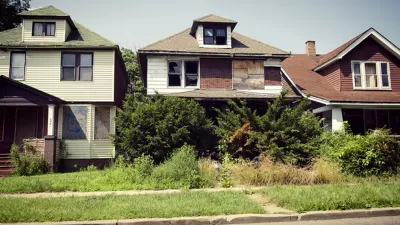A new report uses terms like epidemic and hyper-vacancy to drive home the point about the effects of vacancies on communities like Cleveland, Gary, Toledo, and Detroit.

Patrick Sisson shares insights into a new report from the Lincoln Institute of Land Policy titled "The Empty House Next Door." The report examines "abandoned and unused properties [and] offers a deft accounting of the cost of these buildings on the surrounding areas."
"Compiled by urban scholar Alan Mallach, the report offers a sobering snapshot of just how widespread vacancy has become, especially in the aftermath of the Great Recession," writes Sisson.
Vacant properties aren’t new. According to Mallach, the roots of today’s problem lie in the Great Recession and subsequent foreclosure crisis, in which many homeowners, especially lower-income residents, lost their homes. Combined with the declining population in legacy cities, vacancies have skyrocketed.
The article includes a lot more detail on the research used to build the report's conclusions. Alan Mallach also authored a new book on related subjects, The Divided City, published this month by Island Press.
FULL STORY: The high cost of abandoned property, and how cities can push back

Alabama: Trump Terminates Settlements for Black Communities Harmed By Raw Sewage
Trump deemed the landmark civil rights agreement “illegal DEI and environmental justice policy.”

Planetizen Federal Action Tracker
A weekly monitor of how Trump’s orders and actions are impacting planners and planning in America.

How Atlanta Built 7,000 Housing Units in 3 Years
The city’s comprehensive, neighborhood-focused housing strategy focuses on identifying properties and land that can be repurposed for housing and encouraging development in underserved neighborhoods.

In Both Crashes and Crime, Public Transportation is Far Safer than Driving
Contrary to popular assumptions, public transportation has far lower crash and crime rates than automobile travel. For safer communities, improve and encourage transit travel.

Report: Zoning Reforms Should Complement Nashville’s Ambitious Transit Plan
Without reform, restrictive zoning codes will limit the impact of the city’s planned transit expansion and could exclude some of the residents who depend on transit the most.

Judge Orders Release of Frozen IRA, IIJA Funding
The decision is a victory for environmental groups who charged that freezing funds for critical infrastructure and disaster response programs caused “real and irreparable harm” to communities.
Urban Design for Planners 1: Software Tools
This six-course series explores essential urban design concepts using open source software and equips planners with the tools they need to participate fully in the urban design process.
Planning for Universal Design
Learn the tools for implementing Universal Design in planning regulations.
Caltrans
Smith Gee Studio
Institute for Housing and Urban Development Studies (IHS)
City of Grandview
Harvard GSD Executive Education
Toledo-Lucas County Plan Commissions
Salt Lake City
NYU Wagner Graduate School of Public Service





























